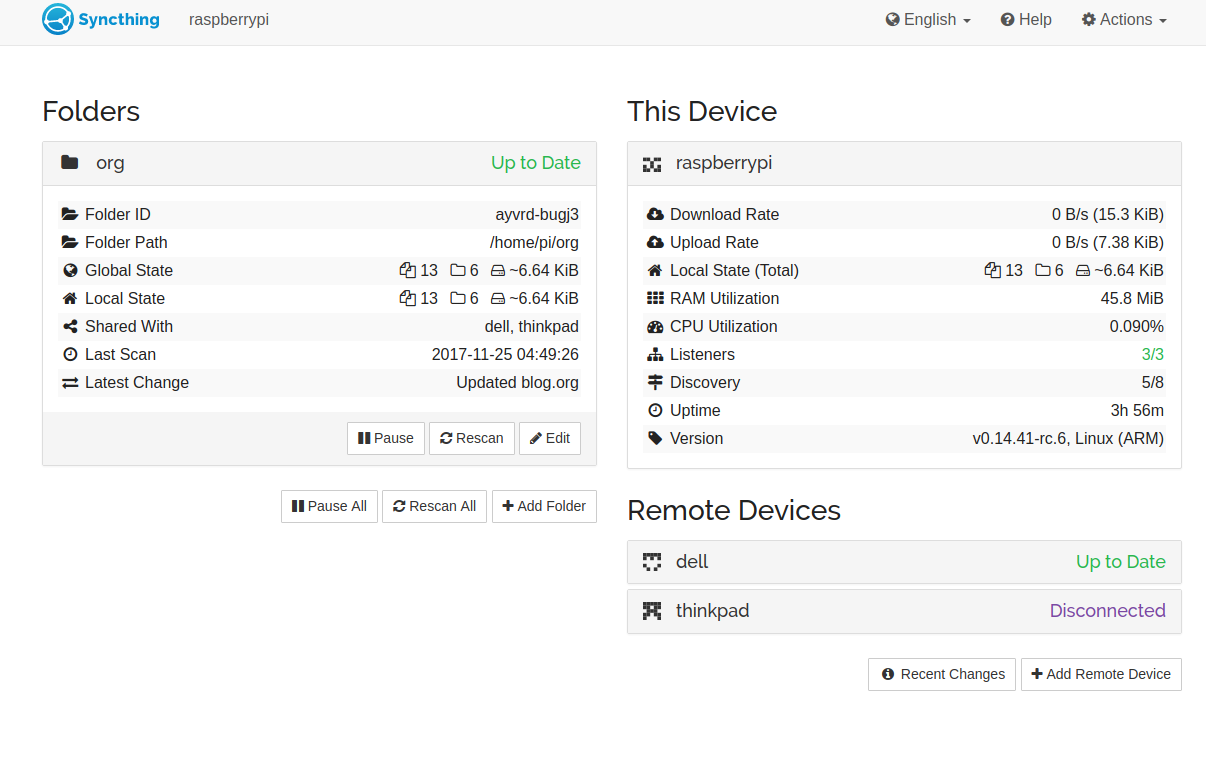Emacs + Org-mode + Syncthing = Perfect combo
Taking notes is a part of my life and work: jot down ideas, manage tasks and track personal projects. But soon came a problem, what tool is best for supporting this simple task.
There are 3 must-have features I searched for:
-
Markdown (or relevant) editor
-
Auto-sync between machines
-
Less but not least, affordable price
Searching journey
As for me, todo note or shopping list is too trivial. And editing markdown on smart phone sucks and inconvenient. So I just focus on PC and laptop station here.
I found Boostnote first. Free as it’s a FOSS (Free and Open Source Software). But this fancy editor is (as expected) built on Electron, a RAM-hungry framework. No built-in sync feature, but enabled through third party like Google Drive or Dropbox.
Since I didn’t like the roundabout syncing, so Inkdrop is my second stop. Also built on Electron, but came with built-in sync service through CouchDB, and charge you less than $5 per month. This was pretty suitable for me, and I felt comfortable in 2-month trial. The creator also wrote a post about process of building his product, which is very interesting to know about.
But I don’t really like the idea of a RAM-killer app for just a simple task like saving texts. There should be another ways for rubbing my itch.
The unicorn came to the rescue
Vim was my main editor, until I knew about Org-mode, which is only fully available on Emacs.
Vim was good, but I’m somewhat not in the mood of learning Vimscript for long-term scaling my .vimrc. In contrast, I love Lisp - the good old legend survived through time.
So Emacs Lisp + Org-mode are 2-main reasons made me make a switch to a new life-long partner: Emacs.
So after grabbing the basics and setting a somewhat decent .emacs.d, fully integrating Org-mode, life is damn good.
;; [...]
;; simple setup
(require-package 'org)
(add-hook 'org-mode-hook 'turn-on-font-lock)
(global-set-key "\C-cl" 'org-store-link)
(global-set-key "\C-ca" 'org-agenda)
(global-set-key "\C-cc" 'org-capture)
(global-set-key "\C-cb" 'org-iswitchb)
(setq org-log-done 'time)
;; Turn off auto-fold
(setq org-startup-folded nil)
;; [...]
My dotfiles’s .emacs.d for your information. And a good setup guide for Emacs in my opinion.
Org mode is for keeping notes, maintaining TODO lists, planning projects, and authoring documents with a fast and effective plain-text system.
— org-mode
Talk is cheap, actually use this with powerful key combination really broads my horizon. For example:
-
Add a TODO list with
M-shift-RET -
Mark as completed with a single combination
C-c C-t.
Besides, learning Org syntax is not so hard, from a perspective of a Markdown fan-boy like me.
Syncthing - the lost ingredient to perfect combo
So Emacs + Org-mode is totally free, check. Wonderful Markdown/Org editor, check. It occurred to me that I knew about Syncthing in a Golang blog post:
Syncthing is an open-source cross platform peer-to-peer continuous file synchronization application.
Basically, Syncthing decentralizes your shared data to all connected nodes identified with cryptographic certificates.
I need at least a live node for no-downtime syncing (a central hub). A low cost private cloud server is a good choice, but in my case I used my 99.99% uptime Raspberry Pi 3 (which mainly ran Pi-hole for my home).
# Add GPG key
wget -O - https://syncthing.net/release-key.txt | sudo apt-key add -
# Add repository
echo "deb http://apt.syncthing.net/ syncthing release" | sudo tee -a /etc/apt/sources.list.d/syncthing-release.list
# Update and install
sudo apt-get update
sudo apt-get install syncthing -y
Re-bind configuration from local loopback 127.0.0.1 to 0.0.0.0 (/home/pi/.config/syncthing/config.xml):
<gui enabled="true" tls="true">
<address>0.0.0.0:8384</address>
<apikey>...</apikey>
</gui>
This will enable you to access http://<pi's IP>:8384 Web Interface of Syncthing.
Finally just start syncthing service:
sudo systemctl start syncthing@pi.service
# auto start at start-up
sudo systemctl enable syncthing@pi.service
Access http://<pi's IP>:8384:

Here you can see I shared my /home/pi/org directory which contains all my .org notes to 2 nodes: online dell + offline thinkpad.
Now if I make a change from my /home/dell/org, it will syncs back to /home/pi/org. And when my thinkpad goes online, /home/thinkpad/org auto updates all its notes, too!
Et Voilà! Work like a charm. Plus, both Emacs and Syncthing use just a little of RAM and CPU resource.
Conclusion
Inkdrop solo, (Vim + Git) traditional way, or (Emacs + Org-mode + Syncthing) combo with hands-free syncing? Use the right tool for the job, and pick what suits you the best.
For now, Emacs is my everyday editor, including programming stuff and note-taking. Long live (Emacs) Lisp.